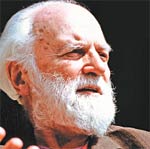“Do not go ungrateful into your everlasting bliss, but let your gratitude surface with your mounting amazement that anything at all exists and that only the first person singular present tense is really and truly awake and is none other than the LOVE that makes the world go round and leaves no-one whatever out.”
Douglas Harding
On the occasion of his ninety-seventh birthday last year

Douglas Harding passed away this January. A unique figure in the spiritual world, he was a totally original spiritual teacher, sage, unorthodox thinker, trailblazer, enlightened English eccentric (in the very best sense of the word), iconoclast, Western Zen master in a lineage of one, and authentic human being—all rolled into one. Never exactly famous, he was nevertheless a permanent fixture in the landscape of the spiritual world, occupying a position similar to that held by another great figure who was better known, J.K. Krishnamurti. After all, Douglas was teaching and sharing his “headless way” for something in the region of half a century.
I actually half suspected that he would live forever. His unbounded enlightened passion, vitality, sheer unstoppable enthusiasm for inquiring into life, and robust stature that he had well into his nineties always gave the impression that he was the wellspring of life itself rather than an elderly gentleman.
Born in 1909 in Suffolk, England, Douglas was brought up in a strict fundamentalist Christian sect. He had an unusual drive for self-inquiry, and he left the sect as a young adult to pursue his own path. Becoming an architect, he moved to India in the mid-1930s to work there. It was while in India that he had the spontaneous awakening that changed his whole life.
He wrote about this later in On Having No Head, the book for which he is still best known, with its unforgettable opening lines:
The best day of my life—my rebirthday, so to speak—was when I found I had no head. This is not a literary gambit, a witticism designed to arouse interest at any cost. I mean it in all seriousness: I have no head.
And Douglas did mean it in all seriousness. In fact, the remaining fifty years of his life were spent in pointing out freely, to all who came to him, that it is unbelievably simple to experience one’s true nature, the Self, the Void, one’s Original Face. He didn’t particularly mind what you called it; he was always just bursting with passion for others to see what he saw.
He invented no end of novel exercises and experiments to get people to see afresh, to directly experience the “first person view,” where you can experience yourself, beyond any concepts of self, as being “headless,” which was Douglas’s particular way of describing seeing your true nature. It can sound facile and oversimplistic, but I can testify that his methods and pointers really do work; it was through Douglas and his exercises that I had my first experience of satori.
I first met him thirty years or more ago after long hearing of this legendary figure who claimed he had no head, who even had a song named in his honor in the sixties by the Incredible String Band. Douglas would throw open his house on the eastern coast of England every weekend, and anyone was welcome to stay there completely free of charge. I have fond memories of those weekends in the little village of Nacton with this gracious and extremely sincere man. We would all pitch in to cook meals alongside Douglas himself, and the weekend would be spent experimenting with his myriad exercises for self-awakening. I can still picture Douglas, eyes twinkling, tirelessly exploring the mystery of being with the enthusiasm of a child, although he was quite a learned man. He would quote the sacred scriptures of various religions and traditions, but he always emphasized that you test the scriptures by your experience and not your experience by the scriptures.
There was one time, perhaps fifteen years ago, that I heard him being interviewed on the radio in San Francisco, by Michael Toms if I remember correctly. The interviewer said, “Douglas, you’re in your eighties and you have a grueling travel schedule, and yet you’re so full of energy. How do you do it?” Douglas paused and replied, “Well, you know, it consumes such a lot of energy if you have to always keep up the pretense that you’re a person.”
I myself had the good fortune to interview him once about ten years ago at his home in England, and he still seemed to defy the normal laws of aging. He talked to me for five hours nonstop and then personally cooked us a meal. It was I who left exhausted at the end.
Thousands upon thousands of people came to see Douglas Harding over the years to experience his unconventional methods of pointing out our true nature. Revisiting him for that interview, I was curious to ask him whether people actually do transform after having these glimpses; in other words, does the insight or experience “stick”? Douglas replied that in his experience only a few people do deeply change, but that was up to them. The results depend on how seriously you take it and how seriously you practice it. His role was just to introduce them to their “original face.”
But for Douglas, the exploration of the wonder and mystery of our true nature was a single-pointed life’s passion, and with his passing we’ve lost a truly unique enlightened man.
–Chris Parish





